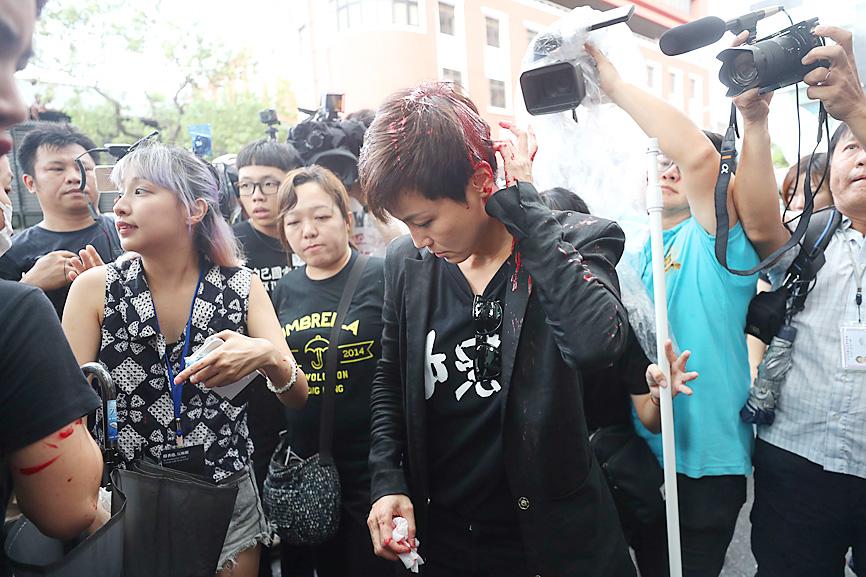The High Court on Thursday upheld a three-month sentence that is commutable to a fine for a man who sprayed paint on Hong Kong democracy campaigner Denise Ho (何韻詩) in Taipei in 2019, dismissing an appeal by prosecutors for a harsher punishment.
The Taipei District Court in January sentenced the main attacker, Hu Chih-wei (胡志偉), to three months in prison, which could be commuted to a fine of NT$90,000, while 10 alleged accomplices were found not guilty.
A masked man threw red paint over Ho, a Hong Kong singer and democracy advocate, when she was being interviewed by reporters ahead of a protest in Taipei in September 2019 in support of Hong Kong’s democracy movement.

Photo: CNA
The attack left Ho’s hair and clothes covered in red paint.
The masked man and another person were immediately detained by police and later identified as Hu and Liang Tai-fu (梁太富) — members of the Taipei-based China Unification Promotion Party.
Further investigation led prosecutors in June 2020 to file four criminal charges — coercion, public humiliation, damage to property and obstruction of assembly — against Hu, Liang and nine other people identified as being involved in the attack.
However, the district court in January ruled that Hu was only liable for damage caused in the incident, handing down a three-month sentence.
Although evidence showed that Hu threw paint on Ho to humiliate her and ruin her clothes, the incident did not hinder Ho’s interview nor did it obstruct the protest, because Hu’s actions lasted a short time, the district court said.
The ruling also said that bad behavior by members of political parties is not a problem that can be solved by courts imposing heavy penalties, but rather requires politicians to set a good example and calm social antagonism.
Prosecutors had sought an eight-month sentence for Hu.
The High Court’s decision is final and cannot be appealed.

Eight restaurants in Taiwan yesterday secured a one-star rating from the Michelin Guide Taiwan for the first time, while three one-star restaurants from last year’s edition were promoted to two stars. Forty-three restaurants were awarded one star this year, including 34 in Taipei, five in Taichung and four in Kaohsiung. Hosu (好嶼), Chuan Ya (川雅), Sushi Kajin (鮨嘉仁), aMaze (心宴), La Vie by Thomas Buhner, Yuan Yi (元一) and Frassi in Taipei and Front House (方蒔) in Kaohsiung received a one-star rating for the first time. Hosu is known for innovative Taiwanese dishes, while Chuan Ya serves Sichuan cuisine and aMaze specializes

STATS: Taiwan’s average life expectancy of 80.77 years was lower than that of Japan, Singapore and South Korea, but higher than in China, Malaysia and Indonesia Taiwan’s average life expectancy last year increased to 80.77 years, but was still not back to its pre-COVID-19 pandemic peak of 81.32 years in 2020, the Ministry of the Interior said yesterday. The average life expectancy last year increased the 0.54 years from 2023, the ministry said in a statement. For men and women, the average life expectancy last year was 77.42 years and 84.30 years respectively, up 0.48 years and 0.56 years from the previous year. Taiwan’s average life expectancy peaked at 81.32 years in 2020, as the nation was relatively unaffected by the pandemic that year. The metric

Taiwan High Speed Rail Corp. (THSRC) plans to ease strained capacity during peak hours by introducing new fare rules restricting passengers traveling without reserved seats in 2026, company Chairman Shih Che (史哲) said Wednesday. THSRC needs to tackle its capacity issue because there have been several occasions where passengers holding tickets with reserved seats did not make it onto their train in stations packed with individuals traveling without a reserved seat, Shih told reporters in a joint interview in Taipei. Non-reserved seats allow travelers maximum flexibility, but it has led to issues relating to quality of service and safety concerns, especially during

A magnitude 5.1 earthquake struck Chiayi County at 4:37pm today, the Central Weather Administration (CWA) said. The hypocenter was 36.3km southeast of Chiayi County Hall at a depth of 10.4km, CWA data showed. There were no immediate reports of damage resulting from the quake. The intensity of the quake, which gauges the actual effect of a seismic event, measured 4 in Chiayi County, Tainan and Kaohsiung on Taiwan's seven-tier intensity scale, the data showed. The quake had an intensity of 3 in Chiayi City and Yunlin County, while it was measured as 2 in Pingtung, Taitung, Hualien, Changhua, Nantou and Penghu counties, the data